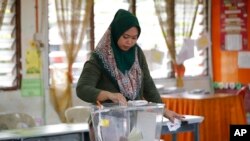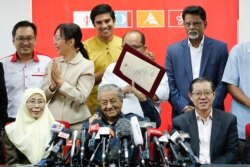Parties on either side of Malaysia's deep political divide are hoping to capitalize on a bipartisan bill to lower the country's voting age from 21 to 18, a move likely to swell the ranks of eligible voters.
The sudden influx of first-time voters, however, could also backfire on either side and risks amplifying some of Malaysia's thorniest political problems, analysts and observers warn.
Malaysia's lower house on Tuesday overwhelmingly approved the constitutional amendment, which would not only lower the voting age but automatically register citizens as they come of age. Together, the changes could boost the country's voter rolls 50 percent by the time of the next general election in 2023.
The Senate must vote on the measure in 30 days and is expected to add its endorsement, fulfilling a campaign promise of the ruling Pakatan Harapan coalition, which ended Barisan Nasional's six-decade run in power in an election upset last year. The measure will also bring Malaysia's voting age in line with most countries.
James Chin, director of the University of Tasmania's Asia Institute, said Pakatan Harapan was banking on most of Malaysia's youngest voters to stick with it through the next election, as they did in 2018; but, he said the last poll would likely prove a poor bellwether for the next, now that the coalition has lost its outsider appeal.
"The problem is that you can't apply the same rules anymore because Pakatan is no longer in opposition. In other words, people supported you previously because they liked the fact that you keep criticizing the government, you keep attacking the government. But now you're part of government; it's much more different. So if things go wrong, people will actually blame you rather than support you," he said.
After years of going under-registered by competing parties scheming to weed out non-partisans, automatic registration will also boost the proportion of eligible voters from the country's majority ethnic Malay community at the expense of others, said Chin.
That could prove problematic for Pakatan Harapan, which drew on the votes of large ethnic Chinese and Indian minorities to win in 2018, and a boon for the nationalist parties it bested.
In an opinion piece for the New Straits Times, a local paper, Deputy Defense Minister Liew Chin Tong, a strategist for one of the ruling parties, said the flood of young voters unburdened by old allegiances heralded an end to Malaysia's toxic racial politics.
Analysts and observers find the promise specious at best. They said Malaysia's ethnic and religious fault lines were too deep to fade without changing the way the country runs its elections.
"Currently the system does not encourage non-communal division; that's ultimately the problem. Adding more voters will not overcome that, but there is a chance it may actually make it worse," said Wong Chin Huat, a political analyst at the Penang Institute, a local research organization.
"Worse because you have more people whose interests would be at stake, and it's simply just more uncertainty. The volatility will get amplified with more people in the game."
Thomas Fann, chairman of Bersih, a local non-government group that campaigns for free and fair elections, agreed, noting the rise of Islamic parties and the madrassas - religious schools - shaping many of Malaysia's soon-to-be eligible voters.
But Fann said Pakatan Harapan could try to hold on to some of the youth vote by wielding the power of incumbency during what's left of its current term.
"Pakatan Harapan has four more years. I think that they will probably be coming out with policies that will be friendly to younger voters, and in that sense younger voters may still be leaning toward Pakatan," he said, naming job creation and vocational training as likely winners.
Fann also warned of another looming effect of the coming amendments.
Because Malaysia's urban centers tend to be younger than the country as a whole, he said, constituencies that are already "supersized" will become "megasupersized," further diluting the value of their votes in Malaysia's first-past-the-post, or winner-takes-all, system.
The government is not due to redraw constituencies for another seven years. Fann said authorities could trigger an early redrawing, but only with another constitutional amendment, which would likely prove a tougher sell than lowering the voting age.
Chin Huat said the new voters could take out their frustrations on the ruling parties if the boundaries stay put.
"What happens is that the urban youth may get very angry if there's no redelineation that takes place after the full expansion of [the] electorate, because what it means is that I get a vote now, but my vote is worth a fifth, a sixth of someone else. And they would not accept any explanation but probably blame the new government," he said.
Chin Huat also warned that the coming youth vote could add to the country's combustible mix of tribal politics and first-past-the-post elections. An electoral reform committee on which he sits has suggested moving toward more proportional representation to help defuse the tension but gotten little traction with parties.
"I would say that there have not been very warm responses across the board," he said. "People do not see the danger is coming."







